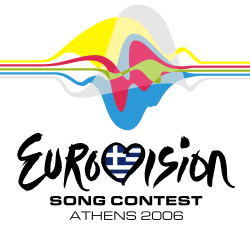
Back مسابقة الأغنية الأوروبية 2006 Arabic 2006 Avroviziya Mahnı Müsabiqəsi Azerbaijani Конкурс песні Еўрабачанне 2006 Byelorussian Евровизия 2006 Bulgarian Eurosong 2006. BS Festival de la Cançó d'Eurovisió 2006 Catalan Eurovision Song Contest 2006 Czech Eurovision Song Contest 2006 Danish Eurovision Song Contest 2006 German Διαγωνισμός Τραγουδιού Eurovision 2006 Greek
| Eurovision Song Contest 2006 | |
|---|---|
| Feel the Rhythm | |
 | |
| Dates | |
| Semi-final | 18 May 2006 |
| Final | 20 May 2006 |
| Host | |
| Venue | Olympic Indoor Hall Athens, Greece |
| Presenter(s) | |
| Executive producer | Fotini Yannoulatou |
| Director | Volker Weicker |
| Executive supervisor | Svante Stockselius |
| Host broadcaster | Hellenic Broadcasting Corporation (ERT) |
| Website | eurovision |
| Participants | |
| Number of entries | 37 |
| Number of finalists | 24 |
| Debuting countries | |
| Returning countries | None |
| Non-returning countries | |
| |
| Vote | |
| Voting system | Each country awarded 12, 10, 8–1 point(s) to their 10 favourite songs |
| Winning song | |
The Eurovision Song Contest 2006 was the 51st edition of the Eurovision Song Contest. It took place in Athens, Greece, following the country's victory at the 2005 contest with the song "My Number One" by Helena Paparizou. Organised by the European Broadcasting Union (EBU) and host broadcaster Hellenic Broadcasting Corporation (ERT), the contest was held at the Olympic Indoor Hall, and consisted of a semi-final on 18 May, and a final on 20 May 2006. The two live shows were presented by American television personality Maria Menounos and Greek former contestant Sakis Rouvas.[1]
Thirty-seven countries participated in the contest. Armenia took part for the first time. Meanwhile, Austria, Hungary, and Serbia and Montenegro announced their non-participation in the contest. Serbia and Montenegro had intended to participate, but due to a scandal in the national selection, tensions were caused between the Serbian broadcaster, RTS, and the Montenegrin broadcaster, RTCG. Despite this, the nation did retain voting rights for the contest.
The winner was Finland with the heavy metal-song "Hard Rock Hallelujah", performed by Lordi and written by lead singer Mr. Lordi. This was Finland's first victory in the contest - and first top five placing - in 45 years of participation, the longest time a country had competed without a win at that point. It was also the first ever hard rock song to win the contest, as well as the first band to win since 1997. Russia, Bosnia and Herzegovina, Romania and Sweden rounded out the top five. Bosnia and Herzegovina achieved their best result in their Eurovision history. Further down the table, Lithuania also achieved their best result to date, finishing sixth. Of the "Big Four" countries Germany placed the highest, finishing joint fourteenth (with Norway).
The contest saw the 1,000th song performed in the contest, when Ireland's Brian Kennedy performed "Every Song Is a Cry for Love" in the semi-final.
- ^ "In pictures: Eurovision 2006". BBC News. 21 May 2006. Archived from the original on 30 October 2020. Retrieved 9 August 2008.
